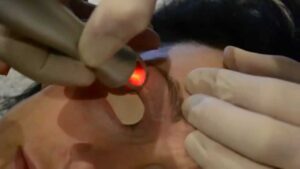Does laser surgery help dark circles under eyes?

There are many reasons why people develop dark circles under their eyes, including genetics, lack of sleep, chronic rubbing and exposure to sun rays.
Fortunately, there are several clinical methods and products that can help diminish dark eye circles. These include filler injections, eye creams and laser treatments.
What Causes Dark Circles Under Eyes?
Dark circles under the eyes are often caused by a number of factors, including lack of sleep and sun exposure. Fortunately, there are several at-home treatments that can help lighten the discoloration and reduce puffiness.
- Dehydration: Without proper hydration, the skin around your eyes will become dull and sunken. This can make the appearance of dark circles more apparent because it makes them appear darker, according to dermatologist Jennifer Zeichner, M.D.
- Sun exposure: The sun’s rays can increase melanin production, which can make the skin look darker and give it a shadowy appearance. Taking care to avoid excessive sun exposure is key to keeping your eyes looking bright and even, as it can also cause your skin to develop age spots, says board-certified dermatologist Rebecca Marcus, M.D., FAAD.
- Genetic hyperpigmentation: People who have a family history of dark under eye circles may have more pigmentation in the skin around their eyes, which can make them look darker. This condition is called “genetic hyperpigmentation,” and it’s typically an inherited trait seen early in life.
- Age-related volume loss: As we get older, the tissue under the eyes starts to thin. This can lead to a reduction in the thickness of the skin and cause the area to look puffy and swollen.
- Medications: Some medications that can make the blood vessels under the eyes dilate, such as those that are used to treat high blood pressure and heart disease, can also contribute to dark circles, explains board-certified dermatologist Andrea Suarez, M.D., FAAD.
Aside from these medical conditions, dark circles under the eyes can be a sign of an underlying health issue, such as iron deficiency. If you’re experiencing these issues, you should consult with a doctor to determine the best treatment for you.
What Causes Dark Circles Under Eyes to Get Worse?
Dark circles can get worse for a variety of reasons. While a lot of the time, dark circles are the result of genetics and thin skin, sometimes they can be caused by fatigue, allergies or smoking.
It is important to note that there are some things you can do to make dark circles under your eyes less noticeable. Taking the time to identify what may be causing your dark eyes can help you find a treatment that works for you.
Getting adequate sleep is another great way to reduce the appearance of dark circles. Try to get at least 7-8 hours of sleep each night and avoid using your cell phone before you go to bed.
The right sleep position also can help to reduce the appearance of your dark circles. Ideally, you should sleep on your back with your head elevated, which will prevent fluid from pooling around your eyes.
Alcohol is another cause of under-eye puffiness and dark circles, so make sure you drink a lot of water instead of the occasional glass of vino. It’s not good for your heart, and it can dehydrate the area.
A diet that is too rich in salt can also contribute to dark circles, so try to eat foods that are low in sodium. You should also avoid ultra-processed foods that are high in sugar and salt.
Allergic reactions to pollen and other irritants can cause a buildup of histamines in the blood vessels, which can break down the wall of the blood vessel and release pigment that causes dark circles under your eyes. Those who suffer from seasonal allergies should try to minimize their symptoms by treating the allergy and then keeping their nose, eyes and hair clean.
How Do Dark Circles Under Eyes Get Worse?
Dark circles are a common problem that can be caused by a number of factors, including fatigue, lack of sleep, sun exposure and allergies. If you are experiencing this problem, it is important to understand the underlying causes of the condition so that you can determine which treatment is most effective for you.
One of the most common reasons that dark circles under eyes get worse is thinning skin. The thin skin makes it easier to see the blood vessels that are present under the eye. It also causes the lower eyelid to “sink in” a little, making shadows under the eye more prominent.
Other contributing factors include aging, which leads to a loss of fat and collagen. It also causes the skin to become more prone to stretch marks and wrinkles.
In some cases, these problems can be corrected through cosmetic procedures such as filler injections. However, they must be administered by a dermatologist (a doctor who specializes in conditions of the skin, hair and nails).
Laser treatments for dark circles are an excellent option to lighten the appearance of the area, stimulate new collagen and reduce hyperpigmentation. The lasers are ablative or nonablative and work by gently removing excess melanin while stimulating the skin’s natural rejuvenation process.
Another cause of dark circles under eyes is vascular congestion, which occurs when blood vessels under the skin become enlarged. This can be hereditary or result from poor circulation, and can be treated with a vascular laser.
The most common type of vascular laser is the KTP (Keratolytic Trichloroacetic acid) laser, which uses a small amount of energy to stimulate and eliminate red capillaries. The procedure can be repeated to ensure permanent results.
How Do Dark Circles Under Eyes Get Better?
Lasers are a popular treatment for a number of cosmetic issues, including dark circles. These treatments reduce hyperpigmentation and stimulate skin rejuvenation by exposing the underlying tissue to intense light. There are several types of lasers that can treat dark circles, depending on their wavelength, pulse characteristics and radiant exposure.
Ablative lasers remove the outer layers of skin that contain excess melanin, while nonablative options improve the appearance of dark circles by stimulating additional collagen production. Both options are effective in improving the appearance of dark eye circles and can be used to treat a wide variety of different skin types.
Whether you are dealing with dark circles due to ageing, volume loss or fat descent, or genetics, laser surgery may be the right treatment for you. During the procedure, heat from the laser is absorbed by the targeted area, and the treated cells are damaged to encourage their natural production of collagen.
Another common cause of dark circles under eyes is thinning or depressed skin around the lower eyelid region. This causes blood vessels to become more noticeable under the thin skin, and creates a “tear trough” or “bag” that can lead to shadows beneath the eyes.
The best way to avoid dark circles is to drink plenty of water, as well as other hydrating liquids throughout the day. This can help to keep the skin around your eyes hydrated, which is important for keeping your face and body looking young and fresh.
Although there are many topical products available OTC that can help reduce the appearance of dark circles, they cannot correct the pigmentation underneath the skin. Those who are severely dissatisfied with the condition should speak to a board certified dermatologist about more aggressive options, such as chemical peels or laser resurfacing.
What Are the Best Treatments for Dark Circles Under Eyes?
If you’re suffering from dark circles under eyes, it’s important to know that there are several treatments available that can reduce their appearance. The best way to determine which treatment is right for you is to consult with a cosmetic dermatologist who will analyze your skin and help you find the solution that’s best for your skin.
The most common causes of dark circles include heredity, gravity, stress, allergies, and aging. Patients who prioritize a good night’s sleep, hydrate their skin, and protect their eyes from environmental factors typically see improvement in their dark circle appearance over time.
In addition, avoiding smoking and sun exposure can also reduce dark circles, says board-certified dermatologist Caren Campbell, M.D. She recommends adding a brightening cream or serum with ingredients like vitamin C, retinol, kojic acid, and neuropeptides to your daily skincare routine.
Another effective treatment for dark circles is laser surgery, which can reduce their appearance by reducing pigmentation, treating vascularity and softening fine lines and wrinkles, according to board-certified cosmetic dermatologist Cameron Rokhsar, M.D. He offers a variety of procedures including lasers, microneedling, Botox injections, dermal fillers, and chemical peels.
Depending on the cause of your dark circles, you may be able to treat them at home by applying an eye gel mask or a cold compress. Ice cubes are an easy way to improve blood flow around the eyes and can be used on the area before bed.
If you’re dealing with more severe dark circles, you might consider injectable treatments such as collagen or hyaluronic acid gel. These products can increase the volume under your eyes, making them appear more plump and youthful, according to O’Keefe.




